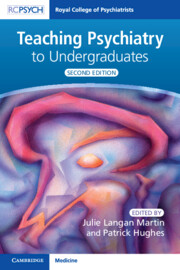Book contents
- Teaching Psychiatry to Undergraduates
- Teaching Psychiatry to Undergraduates
- Copyright page
- Contents
- Contributors
- Section 1 Principles of Medical Education
- Section 2 The Undergraduate Psychiatry Curriculum: Planning and Delivery
- Section 3 Clinical Placements in Psychiatry
- Section 4 Formal Teaching
- Section 5 Materials Development
- Chapter 5.1 Online Learning
- Chapter 5.2 The Flipped Classroom
- Chapter 5.3 Use of Technology and Social Media
- Section 6 Gathering feedback and quality improvement
- Section 7 Student Welfare
- Section 8 Developing as a medical educator
- Index
- References
Chapter 5.3 - Use of Technology and Social Media
from Section 5 - Materials Development
Published online by Cambridge University Press: 12 October 2022
- Teaching Psychiatry to Undergraduates
- Teaching Psychiatry to Undergraduates
- Copyright page
- Contents
- Contributors
- Section 1 Principles of Medical Education
- Section 2 The Undergraduate Psychiatry Curriculum: Planning and Delivery
- Section 3 Clinical Placements in Psychiatry
- Section 4 Formal Teaching
- Section 5 Materials Development
- Chapter 5.1 Online Learning
- Chapter 5.2 The Flipped Classroom
- Chapter 5.3 Use of Technology and Social Media
- Section 6 Gathering feedback and quality improvement
- Section 7 Student Welfare
- Section 8 Developing as a medical educator
- Index
- References
Summary
This chapter explores some of the opportunities and challenges that technology and social media have brought to medical education, teaching, and practice. Finally, guidelines on doctors’ use of social media are highlighted.
- Type
- Chapter
- Information
- Teaching Psychiatry to Undergraduates , pp. 138 - 143Publisher: Cambridge University PressPrint publication year: 2022

